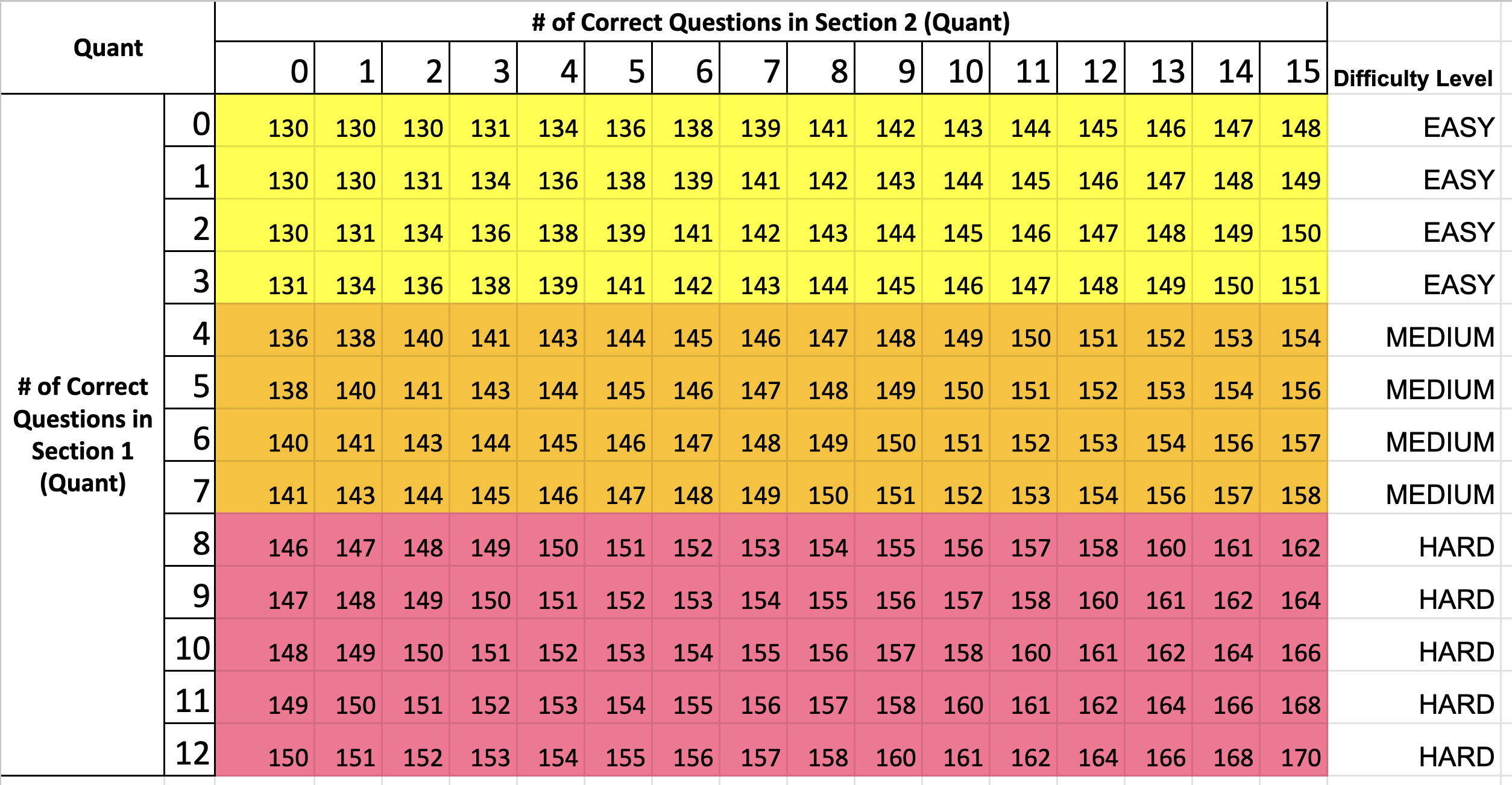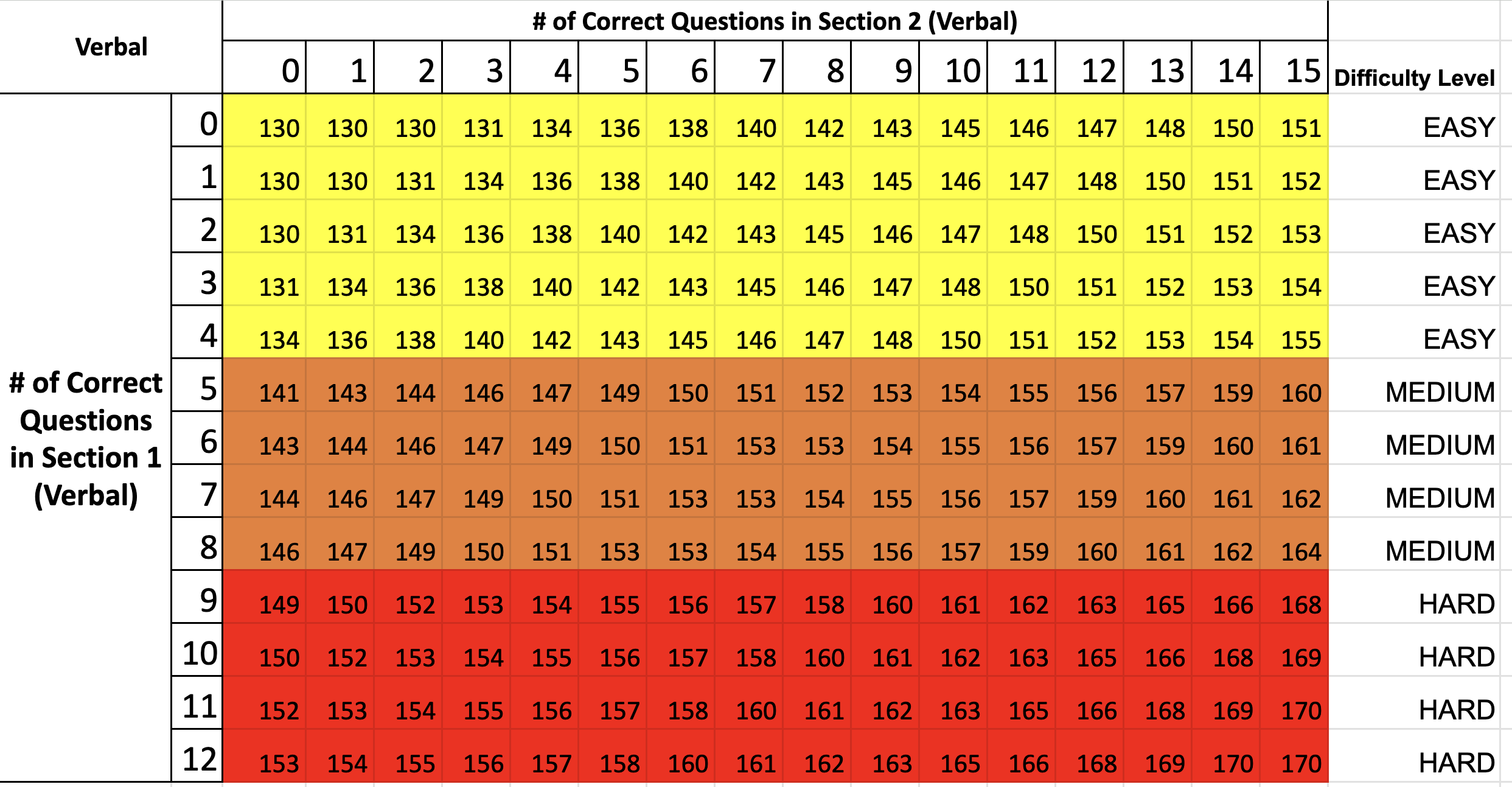The GRE Scoring Grid has been updated for the New Shorter GRE that was launched in September 2023.
Over the past years, I have seen a lot of debate going on regarding the GRE Scoring algorithm and the GRE scoring methodology. Confusions abound!
Students are unable to decipher how the ETS scores the GRE test and that makes it very tricky for prospective GRE test takers to strategize for the test.
How is it possible that one student can get a 155 on the verbal part by just getting 2-3 questions correct on the second verbal section? To answer that, I recently dug deeper into how the GRE scoring algorithm works on the new Shorter GRE.
We all know that the GRE is an adaptive test and the tests difficulty level varies according to your performance. If you do well in the first section, you will get a harder second section and vice versa. Similarly, harder the section, the more weight it has in your overall score.
You can learn more about the GRE sections weights and adaptability mechanism in this post.
Using GRE student’s actual test day score reports, I have tried to come up with an estimate of how you can earn the score you want. The tables in this post are based on actual GRE score reports and I have used that data to approximate, with some +/-2 error range, different GRE score scenarios on your actual GRE exam.
I have shared some sample score reports that I used for my analysis over here.
In the table below, you will see that the total number of correct questions in the two sections combined does not give you a precise idea of your actual score. For instance, by getting 15 questions correct out of 27 on the two quant sections, you can get a score ranging anywhere from 148 to 153. Similarly by getting 15 questions correct out of 27 on the two verbal sections, you can get a score ranging anywhere from 151 to 156.
It all depends on the section on which you got most of the questions correct. The conclusion of this data is that you must get most of the questions correct on section 1 to get a high score.
For example, by if you score 12/12 on section 1 and 0/15 on section 2, you will get a verbal score of 153. However, if you get 0/12 on section 1 and 12/15 on section 2, you will get a meager 147. Hence section 1 is vital.
In this Article
Quant Scoring Grid
View the Quant Scoring Grid in Full Screen
Important observations for the Quant Scoring Grid: If you want a really high score (160+), you must ensure that you get at least 8 questions correct on section 1 of quantitative. Since that is the level where the algorithm will adapt to a higher difficulty level for the second section.
If you get 4 to 7 questions correct on section 1, the level of next section will remain the same. If you get less than 4 questions on section 1, the test will adapt to a lower difficulty level for the second section.
Note that how significantly your score will vary around 7-8 and 3-4 correct questions in section 1. These are the boundaries where the quant section adapts. You can greatly enhance or reduce your scores by scoring around these on each section.
Verbal Scoring Grid
View the Verbal Scoring Grid in Full Screen
Important observations for the Verbal Scoring Grid: If you want a really high verbal score (165+), you should ensure that you get at least 9 questions correct on section 1 of verbal since that is the point where the algorithm will adapt to a higher difficulty level. From 5 to 8 questions correct on section 1, the level of next section will remain the same. However, below 5 questions correct on section 1, the test will adapt to a lower level.
In the verbal table, note how significantly your score will vary around 8-9 and 4-5 correct questions in section 1. These are the boundaries where the test adapts. You can greatly enhance or reduce your scores by scoring around these on each section.
Now hopefully by knowing how the GRE scoring matrix works, you’ll be able to gauge just how much you need to get on each section to hit the target. Of course, there will be a slight error in the table since it is predicted based on a sample data of 100+ GRE students. Nevertheless it is pretty much accurate and will unwind the confusions surrounding the GRE scoring mechanism.
Scoring Range
The total GRE score ranges from 260 to 340. The Math score ranges from 130-170 and the Verbal score ranges from 130-170 as well.
Verbal Score Range: 130-170
Quantitative Score Range: 130-170
Combined Quant and Verbal Score Range: 260-340
AWA Score Range: 0-6


